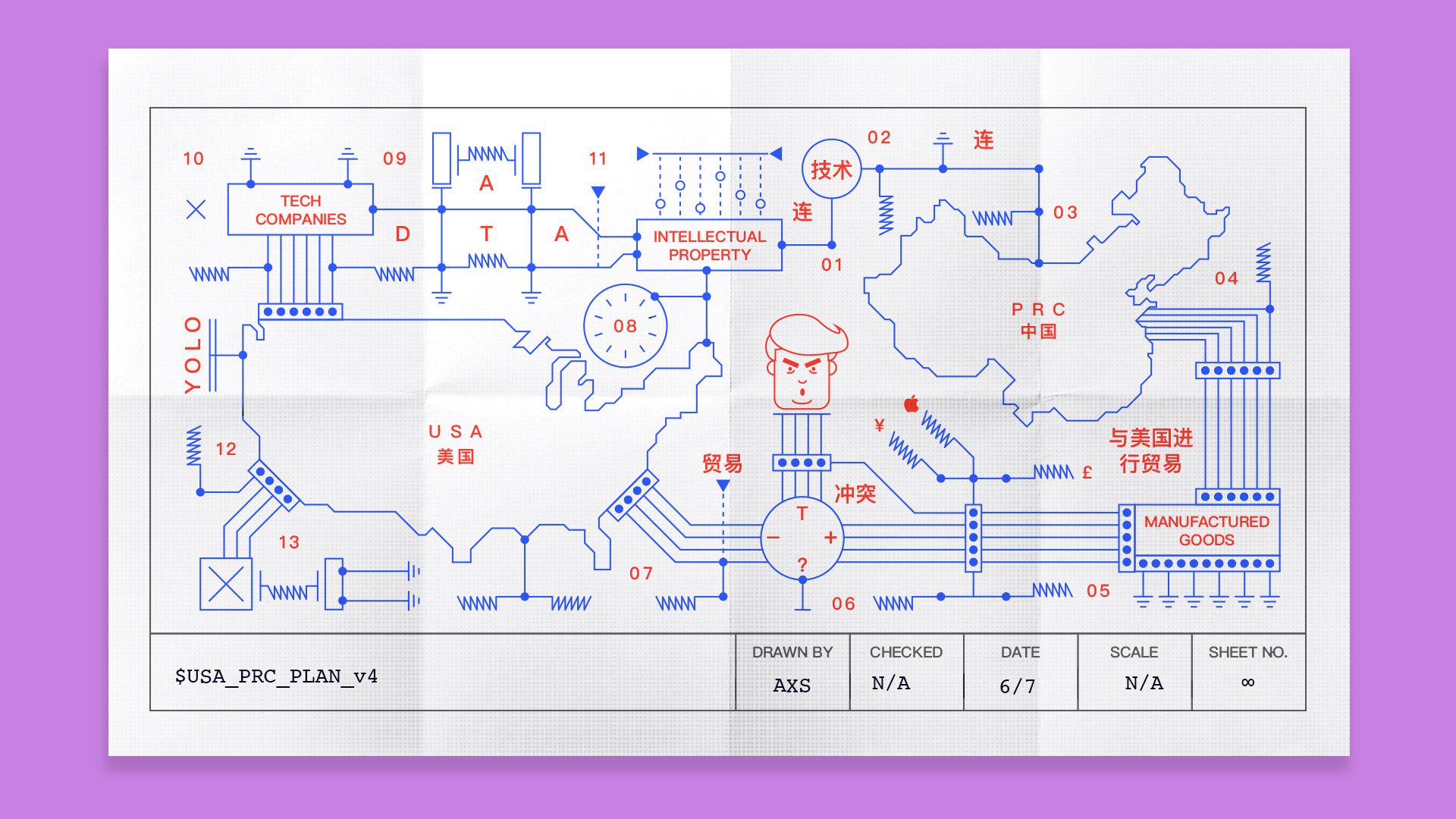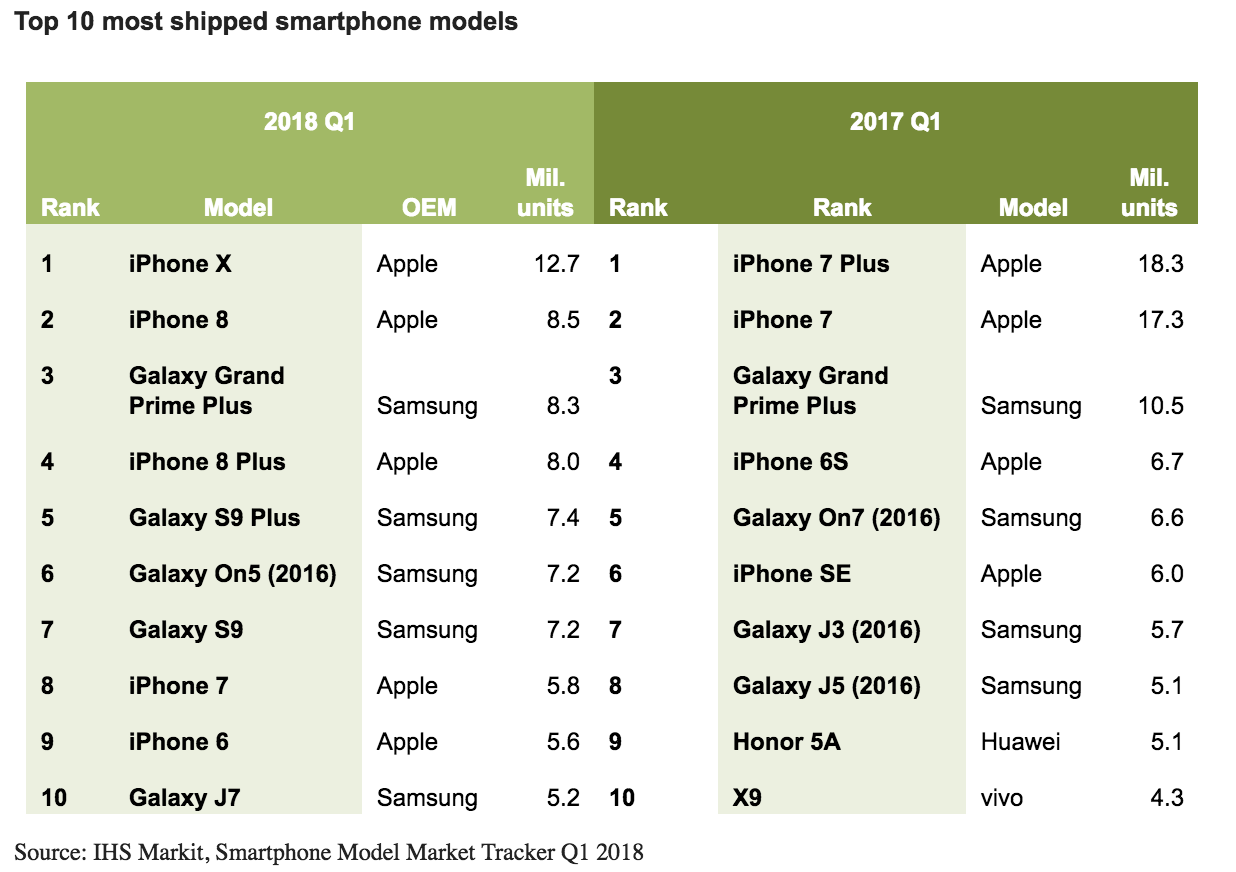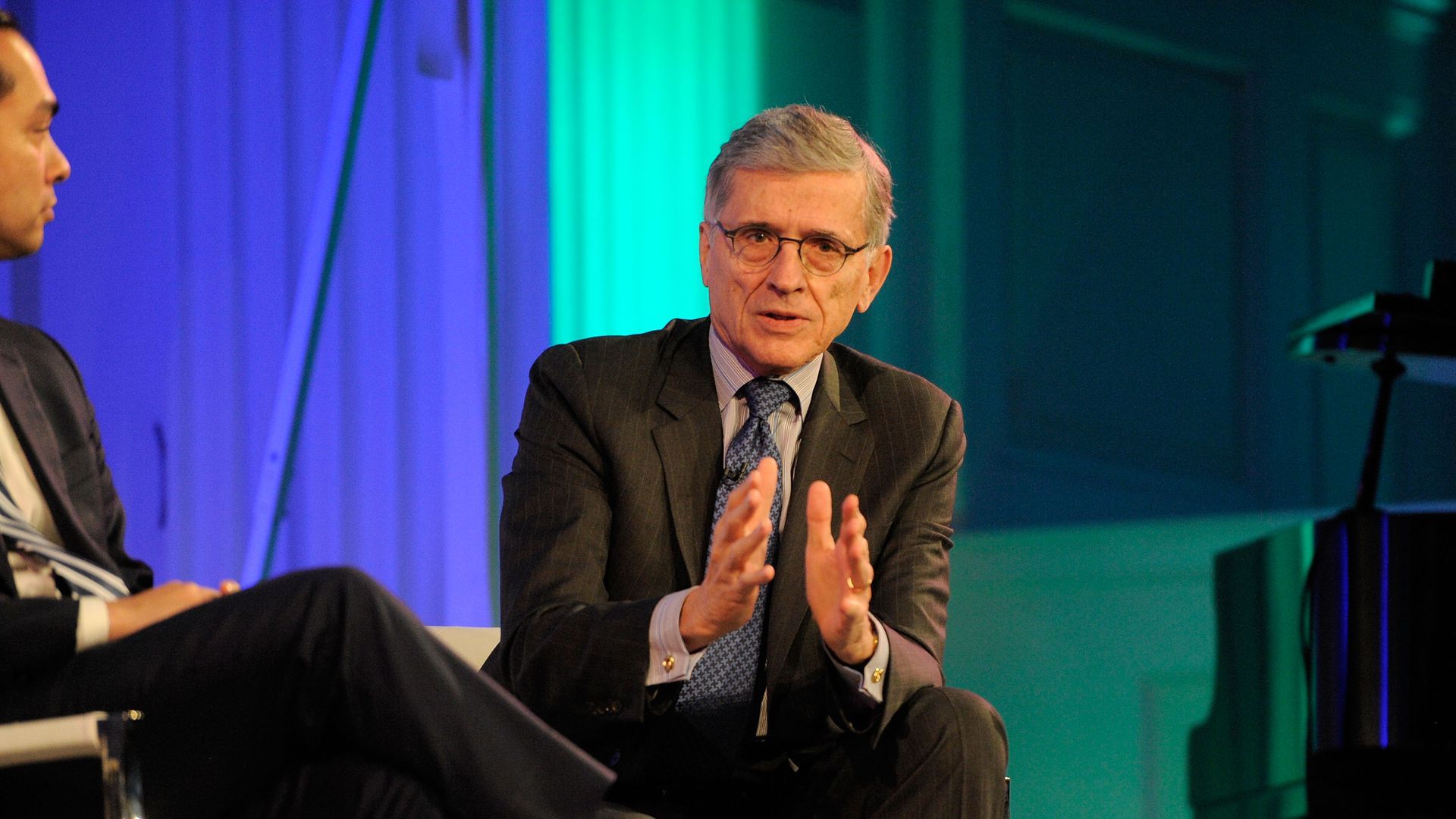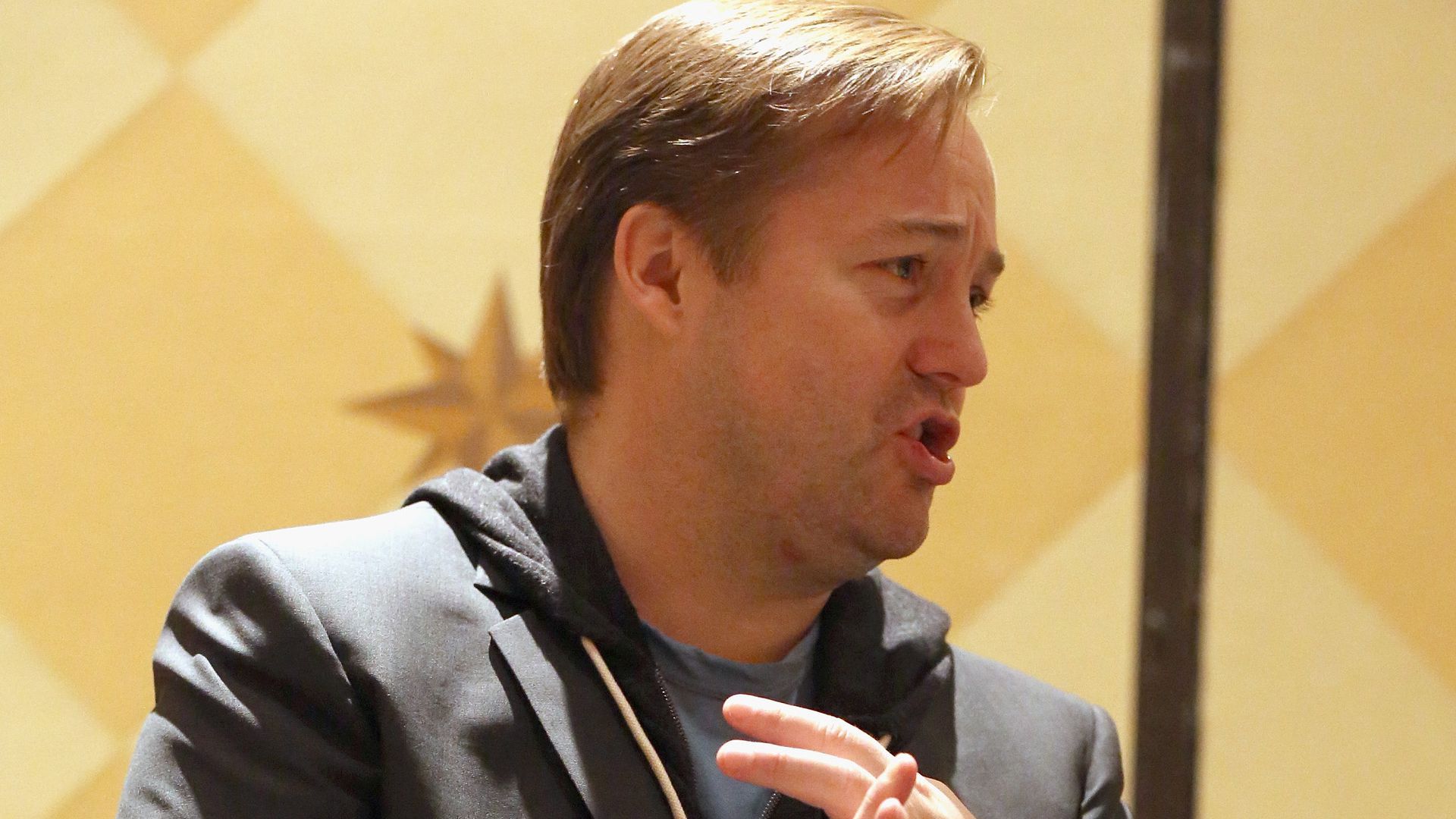June 07, 2018
Axios is the exclusive coverage partner for Nielsen’s annual Consumer 360 Summit today and tomorrow in Washington, D.C. Speakers include marketing and advertising executives from Facebook, Snapchat, CBS and more. Look for Sara Fischer's coverage throughout the day in the Axios stream for all-day coverage of the event.
1 big thing: Tech issues with China aren't simple

Illustration: Lazaro Gamio/Axios
As tech companies get drawn into the deepening trade fight between the U.S. and China, sound bites are winning at the expense of a smarter understanding of the two nations' web of competition and cooperation.
"That complexity doesn’t translate well on a bumper sticker," says Dean Garfield, head of Information Technology Industry, a trade group representing U.S. and global tech companies.
The bottom line: Understanding where the U.S. is vis-à-vis China means accepting hard and competing truths. It's true that China would love its tech industry to take over more of the leadership and value the U.S. has in areas like chips, software and internet services. And it's equally true that the U.S. is utterly dependent on China.
Where we are now: Facebook is the latest company to get caught up in the battle over China, with leading papers blasting headlines such as "Facebook Gave Data Access to Chinese Firm Flagged by U.S. Intelligence."
To be sure: That's true, but keep in mind these headlines could also be true:
- "Google shares entire operating system with nearly every Chinese phone maker"
- "Apple tells Chinese manufacturer exactly how to build its iPhone"
The fact is that Chinese companies are critical suppliers and partners to U.S. tech companies. Using Chinese manufacturing allows consumers around the globe to get the technology they want at prices they can afford, Garfield said.
"No one wants to pay $500 for a t-shirt or $10,000 for a phone," he said. Access to the giant Chinese market is also attractive to U.S. tech companies.
Reasons for concern: This dependence, though, is challenging.
"There is no doubt there are legitimate concerns — both national security and economic — related to China," Garfield said. "The thing that we in the tech sector try to avoid is being reductionist in assuming simply because it is China that it is bad. That is simply not the case."
It's complicated: Political consultant Bruce Mehlman says there is naiveté among both elected officials and industry players, with elected officials "not realizing how global the supply chains have become" and tech companies underestimating the global implications of China's "overwhelmingly aggressive" 2025 plan to dominate the tech industry.
"The core issue is that both nations want to dominate a sector defined by network effects," Mehlman told Axios. "The best innovators leverage bigger data sets, larger consumer bases, global customers, while the most aggressive nationalists aim to box-out others’ products and people."
Speaking of China, Commerce Secretary Wilbur Ross told CNBC this morning that U.S. negotiators have "executed a definitive agreement with ZTE," including a new $1 billion fine and 10 years of compliance monitoring.
- Quick take: The compromise with ZTE — a repeat violator of U.S. sanctions against Iran and North Korea and a company identified as a national security threat by the Pentagon — could set a dangerous precedent for trade negotiations with China.
- But the Trump administration's speedy deal allowing ZTE to keep manufacturing also highlights just how tough it has become to disentangle America's tech interests from China's.
2. Samsung and Apple lead smartphone world

Just how dominant are Apple and Samsung in the global smartphone business? Well, for the first three months of the year, the top 10 phones all came from one of those firms, according to IHS Markit.
The bottom line, per IHS Markit: Apple and Samsung not only dominate the list of the best-selling models, but the two firms also account for nearly all the industry's profits, with the combined rest of the industry struggling to break even.
- Apple's iPhone X was the top selling model for the quarter, followed by the iPhone 8.
- In third, and ahead of the Galaxy S9 and S9+, was a Samsung phone that most people in the U.S. probably haven't heard of: The Galaxy Grand Prime Plus. It's a big-screen, but low-end smartphone that dates back to November 2016.
- While Apple held the top two spots, as it has for a while, those phones accounted for less of the market than in past years.
- “Although Apple’s newest model shipment volume declined, the company announced good earnings in the first quarter, mainly because of price increases in the iPhone 8 series and the super-premium price of the iPhone X,” said Jusy Hong, director of consumer devices for IHS Markit.
3. Wheeler bemoans net neutrality repeal

Former FCC Chairman Tom Wheeler. Photo: Matthew Eisman/Getty Images for Common Sense Media
Former FCC Chairman Tom Wheeler said it's "painful" to see his legacy being systematically erased and warned of the dangers of net neutrality rules going away, Axios' David McCabe reports. On Wednesday, Wheeler said:
"Major local monopolies will be told it is fair to discriminate, and we should not be surprised if, not overnight but over time, we begin to see internet services discriminate in a way that benefits their bottom line rather than the diversity of choices available to consumers and the opportunities available to innovators."
Separately: Wheeler also weighed in on the messy dispute over whether cyberattacks slowed comments on the FCC site during net neutrality debates in 2014 and 2017. David writes more on this here.
4. "Tech dude" evolution and its blind spots

Jason Calacanis. Photo: Earl Mcgehee/Getty Images
Many Silicon Valley leaders believe they've created a meritocracy that's working just fine. Progressive critics and people in groups who feel they've been excluded see it as fundamentally broken.
Our thought bubble: It's rare to see these two perspectives face off head to head, civilly, in a public forum. But, as Axios' Scott Rosenberg observes, that's pretty much what happened at an Oakland event last Friday.
The details: Prominent tech investor Jason Calacanis walked back some controversial comments about bias in tech — and unintentionally offered an inventory of the industry's persistent blind spots on diversity and inclusion.
- Calacanis made clear that he has changed the perspective he had embraced for years in provocative tweets, and now accepts the view that there are real problems with exclusion in the industry. He won applause for that.
- Yes, but: Then he evoked cringes as his conversation displayed a set of stereotypical "arrogant tech dude" traits.
Go deeper: Scott describes what happened here.
5. Apple seeks to patent blood pressure cuff design
Apple has applied for a U.S. patent on a new type of small blood pressure cuff that could connect to a portable device. The patent application, made public late Wednesday, is for a device that could either be part of a portable electronic device or communicate wirelessly with one.
A separate patent application, also disclosed Wednesday, covers a method for producing a registry of health and wellness data, some of which could be shared with researchers, family members or caregivers.
Why it matters: While never a sure indication of any forthcoming products, patent filings can show where the interest of companies lie, and these add to the idea that Apple is putting a lot of energy into the health arena.
6. Take Note
On Tap
- Apple's WWDC wraps up in San Jose.
- Computex continues in Taipei, Taiwan.
- TCL, which has a license to make BlackBerry brand phones, is launching its latest device in New York. Details on the Key2 have leaked widely ahead of the event.
Trading Places
- Ben Elowitz, former CEO of WetPaint and co-founder of Blue Nile, will be managing director of startup studio Madrona Venture Labs. "The startup scene in Seattle has just been exploding," Elowitz said, noting the impact of Big Tech establishing Seattle operations in recent years. One particular area of focus will be on taking machine learning technologies and applying them to various industries.
- Former Qualcomm CEO Paul Jacobs, who is still weighing a bid for that company, launched a new venture, XCOM, that also includes former Qualcomm president Derek Aberle.
ICYMI
- Magic Leap shared a bit more about its secretive augmented reality headset via a webcast to developers, per CNET.
- Sonos introduced the Beam, a $399 Alexa-powered soundbar, The Verge writes.
- USA Today reports that AT&T has dropped a policy that kept some of its phone rivals from advertising on DirecTV.
- Microsoft has started deploying its latest Project Natick undersea data centers, per Quartz.
- Google released a second beta version of Android P, including new emoji designs and final versions of the programming interfaces being made available to developers.
- AppA11y, which specializes in video games for those with visual impairments, acquired Pangia Games.
- The March 22 ransomware attack on Atlanta, Georgia, could cost the city an additional $9.5 million in recovery funds, Reuters reports.
After you Login
Check out this Kickstarter effort to create a cookbook specifically for those dealing with the taste change that often comes with chemotherapy.